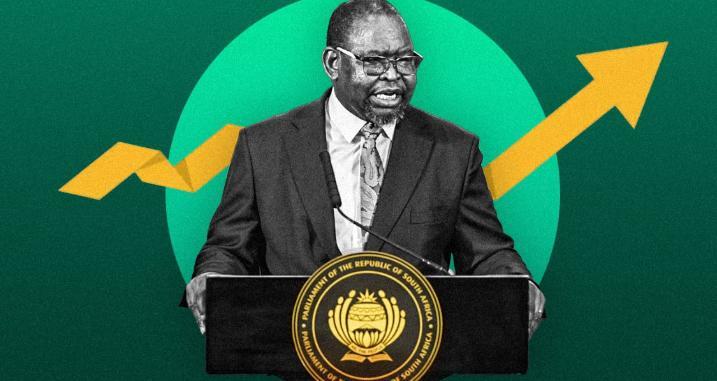Africa-Press – South-Africa. The ANC’s decision to appoint Trevor Manuel as Finance Minister in 1996 resulted in South Africa avoiding bankruptcy, a growing economy, and a significantly reduced state debt burden.
Manuel managed to balance the budget and run consecutive full budget surpluses until 2007/08, which remains South Africa’s last.
South Africa’s credit improved as a result to above investment grade, with billions flooding into the country and the economy growing at a ten-year average annual rate of 4%.
Now, the ANC is hoping that its decision to appoint Enoch Godongwana as Finance Minister in 2021 will have similar effects.
Godongwana is in the second year of his second term as Finance Minister and has overseen the slow and painful process of fiscal consolidation.
This process is beginning to bear fruit after years of containing government spending and squeezing more tax revenue from a stagnant economy.
The painful process is necessary after 15 years of mismanagement, which resulted in skyrocketing government spending, with very little to show for it.
South Africa’s economy stagnated, averaging an annual growth rate of 0.8% for the past decade, pushing government debt as a share of GDP to over 77%.
Government debt as a share of GDP has more than tripled since Manuel left office in 2009, when it was a mere 26% of GDP and declining.
Symmetry chief investment strategist Izak Odendaal explained that fiscal consolidation has resulted in South Africa being closer than ever to achieving a full budget surplus.
In his most recent Medium-Term Budget Policy Statement, Godongwana outlined the rewards of fiscal consolidation, which is the culmination of years of efforts.
Odendaal said this is not a turning point in fiscal policy, but a turning point in investor perception of South Africa as a country with runaway debt.
South Africa is set to record a wider primary budget surplus of 0.9% of GDP in the current financial year, with this widening to over 2% in the next three years.
This means the government is bringing in more revenue than it is spending, excluding debt-servicing costs. It is on track to do this for three years in a row.
A primary budget surplus will result in the government’s debt pile stabilising at 77.9% of GDP in the current year before gradually beginning to decline. In effect, it halts growth in the debt pile.
With faster economic growth forecasted, the picture should improve further as Godongwana’s department remains dedicated to driving reform through Operation Vulindlela.
Coupled with a lower inflation target, the government’s debt-servicing burden should ease, freeing up more capital to spend on productive areas of the budget or pay down its debt.
How Trevor Manuel saved South Africa
Manuel was appointed as South Africa’s Finance Minister in not vastly different circumstances to Godongwana, with the country coming out of a decade of economic and financial mismanagement.
Prior to the 1994 election, South Africa had been through a three-year recession, with the value of the rand plummeting and government debt ballooning.
“Ahead of the 1994 election, South Africa was in serious economic and financial trouble. In the three years before the election, the country had experienced a prolonged recession,” Stanlib chief economist Kevin Lings said.
The first order of the day was to stabilise the economy and the currency, using that as a platform to drive better fiscal outcomes and achieve some of the ANC’s ambitious redistribution plans.
Manuel first worked in government as Trade Minister, where he revolutionised the department to make it a force for economic growth by pushing the liberalisation of the economy and free market principles.
He was sharply criticised for this effort by members of the ANC and trade unions, who argued that he was undermining the ANC’s efforts to “control the commanding heights of the economy”.
At the time, Manuel said his priorities would be “to open up our domestic market to international competition”, thus reversing the isolation of the Apartheid era.
His work in opening up the South African economy to competition and praise from business pushed Nelson Mandela to appoint Manuel as Finance Minister in 1996 with the task of saving a sinking ship.
“The ANC did something brilliant. They appointed Trevor Manuel as Finance Minister. I don’t think he knew he was brilliant, but he ended up there and did remarkable things for this country,” Lings said.
Manuel steered South Africa away from bankruptcy, arresting its decline, and began to build a platform from which the economy could grow.
“The economy took off. It took a couple of years to gain momentum, but then it did really well. In 2008, South Africa’s ten-year average annual growth rate was 4%,” Lings said.
“We have achieved it. It is not impossible. We have hit 4% GDP growth, and the economy has created more than 500,000 jobs a year, with government debt being reduced to 26% of GDP.”
South Africa’s credit rating greatly improved to an A rating from Moody’s, and foreign investment flooded into the country.
While some point to the commodity boom and the additional growth and tax revenue this provided, Lings explained that it was still a brilliant decision for Manuel to use it the way he did.
“Manuel, because of that growth, was collecting lots of tax revenue and generating budget surpluses. What did he do with the extra money? He paid down the country’s debt. He put us in a really good position,” Lings said.
“We were reducing our debt burden and accelerating economic growth. Besides all the other benefits of employment and growing revenue, this was exceptional for South Africa.”
Manuel, who was long regarded as a pragmatist, said in 2013 that he still had little technical knowledge of economics.
“But, I knew that if I set this thing up where people can come with the numbers, and I ask the questions based on life experience and understanding and broad political objectives, then it will work,” he said.
For More News And Analysis About South-Africa Follow Africa-Press






